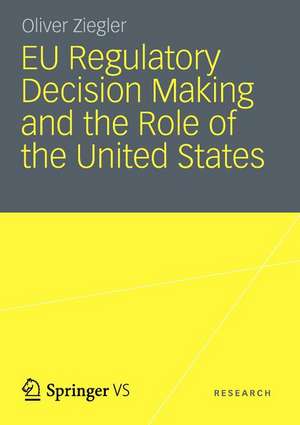EU Regulatory Decision Making and the Role of the United States: Transatlantic Regulatory Cooperation as a Gateway for U. S. Economic Interests?
Autor Oliver Ziegleren Limba Engleză Paperback – 5 sep 2012
Preț: 362.43 lei
Nou
Puncte Express: 544
Preț estimativ în valută:
69.35€ • 72.60$ • 57.38£
69.35€ • 72.60$ • 57.38£
Carte tipărită la comandă
Livrare economică 01-07 aprilie
Preluare comenzi: 021 569.72.76
Specificații
ISBN-13: 9783658000530
ISBN-10: 3658000538
Pagini: 276
Ilustrații: XVII, 255 p. 6 illus.
Dimensiuni: 148 x 210 x 14 mm
Greutate: 0.33 kg
Ediția:2013
Editura: Springer Fachmedien Wiesbaden
Colecția Springer VS
Locul publicării:Wiesbaden, Germany
ISBN-10: 3658000538
Pagini: 276
Ilustrații: XVII, 255 p. 6 illus.
Dimensiuni: 148 x 210 x 14 mm
Greutate: 0.33 kg
Ediția:2013
Editura: Springer Fachmedien Wiesbaden
Colecția Springer VS
Locul publicării:Wiesbaden, Germany
Public țintă
ResearchCuprins
Introduction and Theory.- Introduction and research problem.- A theoretical framework.- The institutional structure of transatlantic regulatory cooperation.- Case Studies.- Waste Electrical and Electronical Equipment.- Ozone-depleting substance.- Animal testing for cosmetic procucts.- Metric labeling.- Summary and Conclusions.- The four cases and their outcome.- Generalizing the conclusions to other cases.
Notă biografică
Oliver Ziegler is an Economic Specialist at the U. S. Embassy in Berlin. Previously, he worked as a research fellow at the German Institute for International and Security Affairs (Stiftung Wissenschaft und Politik) and as a Consultant at the United Nations Industrial Development Organization (UNIDO) in Vienna.
Textul de pe ultima copertă
Oliver Ziegler raises the question of what role economic interests of the United States play in the regulatory decision making process of the European Union. Critics often assume that U. S. dominance in the world economy, fueled by a powerful business elite, has significantly affected EU regulations at the expense of environmental and consumer protection standards. The author falsifies this proposition. He shows, first, that the EU often adopts regulations against the explicit opposition of the U. S. thereby ignoring the principles of transatlantic regulatory cooperation. Second, he demonstrates that business interests in the EU are usually not homogenous and often come second to environmental and consumer concerns. In addition, the author shows the increasing role of the European Parliament in EU regulatory decison making.
Caracteristici
Publication in the field of social sciences Includes supplementary material: sn.pub/extras













